As parents, we often expect some level of night waking in infants. However, if your baby wakes up every hour, it can be frustrating and exhausting. While it’s natural for babies to wake up during the night for feed or comfort, frequent waking beyond the typical stages of development may signal an underlying issue, such as a nutritional deficiency, if the baby wakes up every hour. Nutrition plays a critical role in an infant’s overall well-being, and imbalances or deficiencies can lead to disrupted sleep patterns.
If a baby wakes up every hour at night, it may mean they are not getting enough nutrition. Babies need a good diet to grow and develop properly. If they lack important nutrients, they might feel hungry or uncomfortable, which can cause them to wake up frequently. Parents should talk to a paediatrician to check the baby’s diet and make sure they are getting the right nutrition for better sleep and health.
This article will explore how nutritional deficiency can contribute to sleep disturbances if a baby wakes up every hour. We will also advise parents on identifying and addressing these potential causes. If your baby’s frequent wake-ups are leaving you exhausted, keep reading to discover how proper nutrition might help improve their sleep and ultimately give you the restful nights you both need.
Table of Contents
I Understand Infant Sleep Patterns
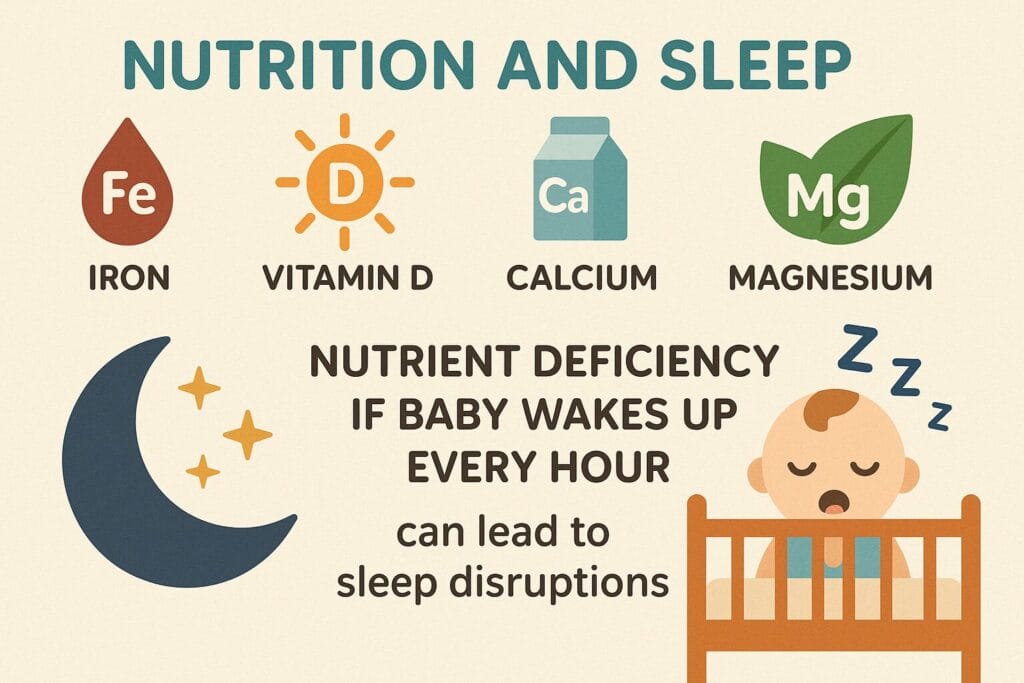
The Normal Sleep Cycle for Babies
Babies have unique sleep patterns, especially during the first few months of life. While adults may sleep for 6-8 hours straight, newborns typically sleep in shorter bursts, waking up every few hours. This frequent waking can be attributed to several factors, including hunger, discomfort, and the natural sleep cycle of REM (Rapid Eye Movement) and non-REM sleep. A nutrition deficiency, if the baby wakes up every hour, is not immediately obvious, but it can significantly impact their ability to stay asleep.
As babies grow, they begin to develop a more regular sleep pattern, with longer stretches of sleep. However, if your baby continues to wake every hour past the typical newborn stage, it may be time to consider potential underlying causes, such as a nutritional deficiency.
When Frequent Waking Becomes a Concern
It’s normal for babies to wake frequently, especially during the first three months. But after 6 months, if your baby still wakes up every hour, it may be a red flag. A nutritional deficiency could be a key factor in investigating whether the baby wakes up every hour. A lack of essential nutrients can result in discomfort, poor sleep quality, and restlessness. Addressing these deficiencies can improve sleep, reduce the frequency of night wakings, and help your baby get the rest they need.
II. The Connection Between Nutrition and Sleep
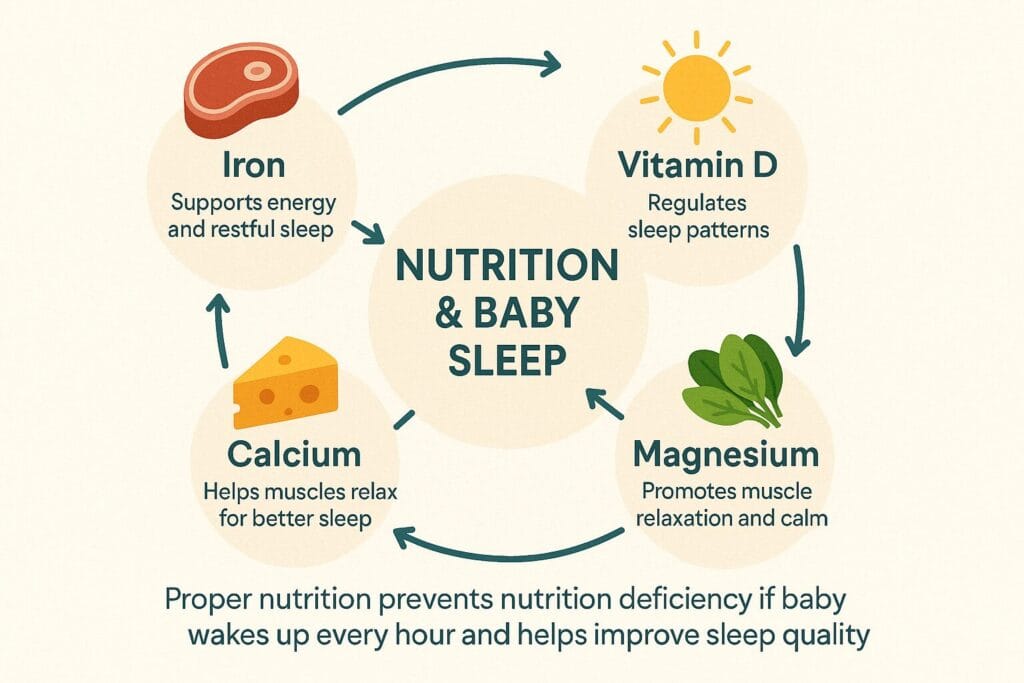
How Nutrients Affect a Baby’s Sleep
Proper nutrition is vital for your baby’s development and health. Babies require a balanced intake of vitamins, minerals, and other nutrients to support growth and to regulate various bodily functions, including sleep. Research has shown that certain nutritional deficiencies can disrupt sleep patterns, causing your baby to wake up more often at night. If the baby wakes up every hour, nutrition deficiency may be the culprit, leading to disruptions that interfere with your baby’s rest and yours.
Nutrients like iron, calcium, vitamin D, and magnesium promote good sleep. Iron, for example, helps transport oxygen throughout the body and supports cognitive development, affecting sleep quality. A deficiency in these nutrients could lead to restless nights and frequent waking, often every hour.
Common Nutrition Deficiencies in Babies
Several nutrition deficiencies are commonly linked to poor sleep and frequent night waking. Recognising these deficiencies early can help prevent your baby from disrupted sleep.
- Iron Deficiency: Iron is essential for oxygen transport and energy production in your baby’s body. An iron deficiency can lead to fatigue, irritability, and difficulty sleeping. If your baby is waking up every hour, nutrition deficiency if baby wakes up every hour could be related to a lack of iron.
- Vitamin D Deficiency: Vitamin D plays an essential role in bone health and affects sleep. Babies with low vitamin D levels often experience more frequent awakenings and may struggle to rest for a whole night.
- Calcium Deficiency: Calcium supports muscle function and relaxation, which are necessary for your baby to sleep comfortably. Without sufficient calcium, your baby may experience discomfort and frequent night wakings.
If you’ve noticed your baby waking up every hour, nutrition deficiency if baby wakes up every hour may be something to consider. Identifying and correcting these deficiencies is crucial to help improve your baby’s sleep.
III. Identifying Signs of Nutrition Deficiency in Babies
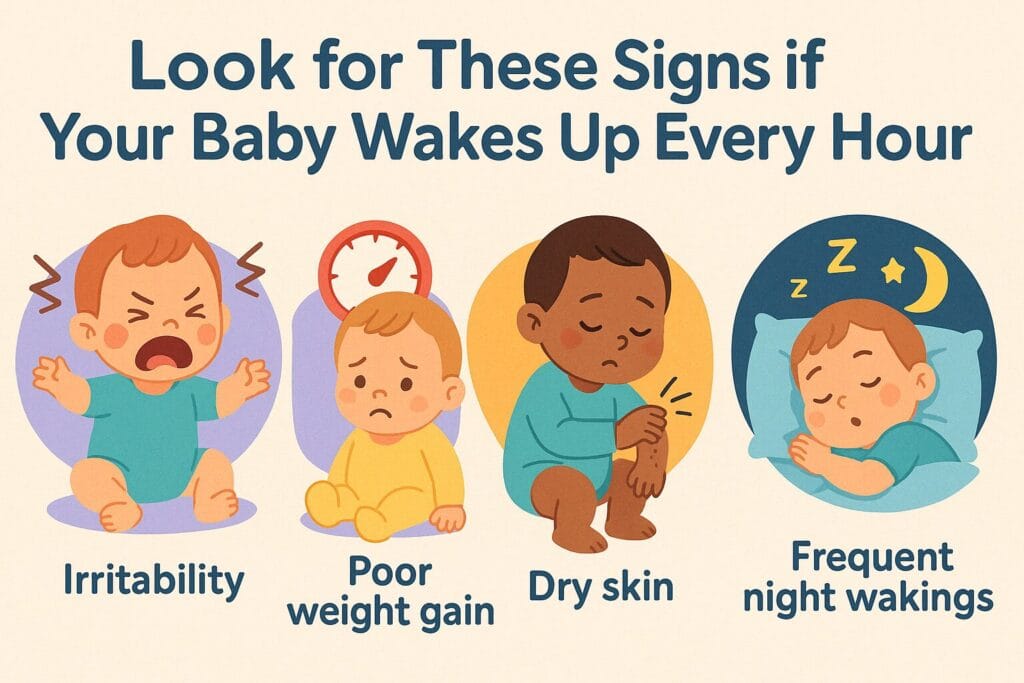
Symptoms to Watch For
If your baby is waking up every hour, it’s essential to consider whether a nutrition deficiency if baby wakes up every hour is the root cause. Several signs could indicate your baby is lacking vital nutrients:
- Irritability and Fussiness: Babies with nutritional deficiencies often become irritable or fussy, especially if they lack iron or vitamin D. If your baby seems restless or difficult to soothe, it might be worth checking for a nutritional imbalance.
- Poor Weight Gain: A lack of nutrients can also affect your baby’s growth, leading to slower or inadequate weight gain. If your baby is not thriving, it could be a sign of a nutritional deficiency if the baby wakes up every hour.
- Skin and Hair Issues: Babies suffering from nutritional deficiencies may experience skin rashes, dryness, or thinning hair. These signs can indicate a deficiency in essential vitamins and minerals.
- Sleeping Patterns: If your baby wakes up every hour or appears uncomfortable while sleeping, it could be due to a lack of vital nutrients supporting their growth and sleep cycles.
By paying close attention to these signs, you can take the necessary steps to improve your baby’s nutrition and help reduce frequent night wakings.
Role of Breastfeeding and Formula
Breastfeeding or formula feeding is essential in providing the nutrients your baby needs for growth and development. Nutrition deficiency, if a baby wakes up every hour, can sometimes be the result of not getting enough milk or formula. If breastfeeding, ensure your milk supply is adequate. If formula feeding, choose a formula that provides the appropriate balance of nutrients.
If you’re concerned about your baby’s sleep despite regular feedings, consider speaking with your paediatrician to evaluate whether they need additional supplements or a change in feeding practices.
IV. Solutions to Address Nutrition Deficiency and Improve Sleep
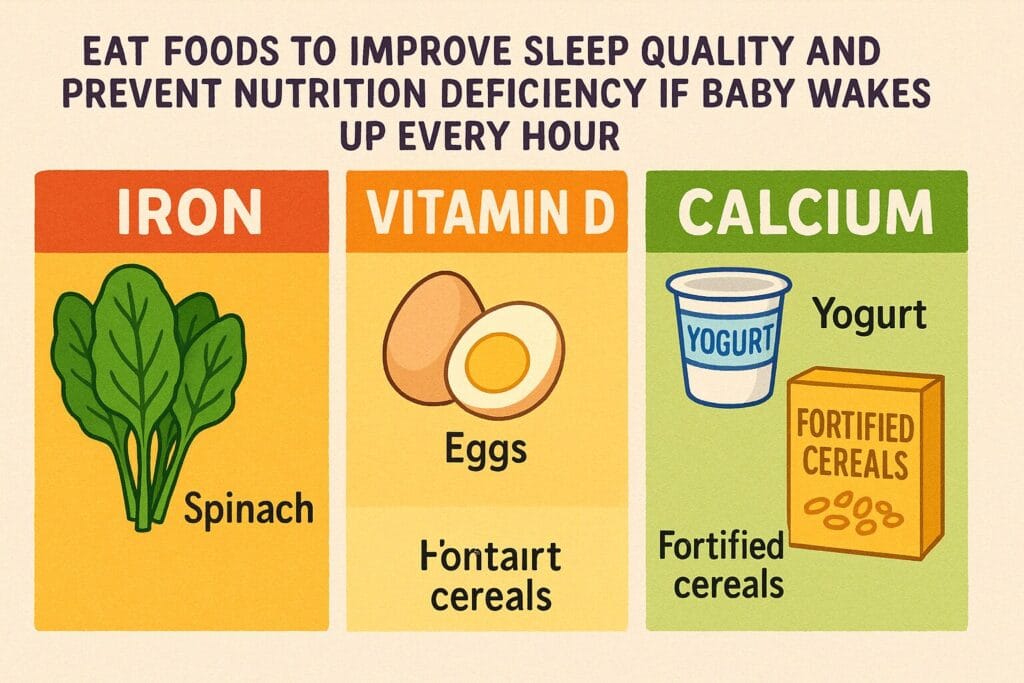
Introducing Nutrient-Rich Foods (for Older Infants)
Introducing nutrient-dense options is crucial once your baby begins eating solid foods (around 6 months). Iron-rich foods like pureed meats, beans, and fortified cereals can help combat iron deficiencies. Calcium-rich foods like yoghurt, cheese, and leafy greens support muscle relaxation and bone health. Vitamin D-rich foods, including fortified cereals and eggs, regulate sleep cycles.
If your baby wakes up every hour, a nutrition deficiency could be mitigated by adding more nutrient-dense foods to their diet. Follow your paediatrician’s advice on introducing solids and aim for a balanced diet supporting growth and sleep.
Adjusting Feeding Schedules
A consistent feeding schedule ensures your baby receives the necessary daily nutrients. Babies may wake up frequently at night if they are not eating enough during the day. If your baby is still waking up every hour, it could be due to hunger or insufficient calorie intake. Adjusting feeding times and ensuring your baby gets enough during the day can help prevent late-night hunger and improve sleep patterns.
Consider Supplementation if Needed
Sometimes, despite a balanced diet, babies may still need supplementation to correct nutritional deficiencies. Supplements may be necessary if your baby is diagnosed with an iron, vitamin D, or calcium deficiency. Consult your paediatrician about appropriate supplements for your baby’s age and needs. In addition, sleep drops for infants, which can contain calming herbs or nutrients, might help relax your baby and promote better sleep.
V. The Role of Sleep Drops for Infants
What Are Sleep Drops for Infants?
Sleep drops for infants are liquid supplements designed to promote relaxation and calmness. They typically contain natural ingredients like chamomile, valerian root, or lavender, which are known to have calming effects. These drops are designed to be safe for infants when used correctly and can be a helpful addition to a bedtime routine for babies who have trouble sleeping.
While sleep drops for infants can help ease your baby into a peaceful slumber, they should not be seen as a cure-all for sleep disruptions caused by a nutritional deficiency if the baby wakes up every hour. It’s essential to address the root causes of poor sleep, such as a nutrient imbalance, alongside the use of sleep drops.
How Do Sleep Drops Help Infants Sleep Better?
Sleep drops help by promoting relaxation and soothing your baby before bedtime. Sleep drops can provide temporary relief for babies who wake up every hour by helping them feel calm and more likely to settle into a restful sleep. However, they should be used alongside proper nutrition and feeding practices to achieve long-term improvements in your baby’s sleep patterns.
Choosing the Right Sleep Drops for Your Baby
When considering sleep drops for infants, choosing products specifically designed for your baby’s age group and needs is essential. Always check the ingredients list and consult your paediatrician to ensure your child’s sleep drops are safe.
Discover how sleep drops can help your infant sleep more soundly and naturally. Click here to explore the 7 key benefits of this gentle solution for better sleep!
VI. When to Consult a Paediatrician
Professional Guidance for Persistent Sleep Issues
If your baby continues to wake up every hour despite addressing nutritional needs and using sleep drops, it may be time to consult a paediatrician. Nutrition deficiency may not always be the issue if your baby wakes up every hour; other factors, such as reflux, allergies, or sleep disorders, could be the cause. A paediatrician can rule out other possibilities and provide further recommendations.
The Importance of Regular Check-Ups
Regular pediatric visits are crucial for monitoring your baby’s growth, development, and overall health. Your paediatrician will ensure that your baby is receiving the right nutrients and that any sleep concerns are addressed in a timely manner. Always consult your doctor if you are worried about your baby’s nutrition or sleep habits.
FAQS
What does it mean if my baby wakes up every hour?
If your baby wakes up every hour, it may indicate a nutrition deficiency if baby wakes up every hour. Nutritional imbalances, such as insufficient iron, calcium, or vitamin D, can disrupt sleep patterns. It’s essential to assess your baby’s diet and consult a paediatrician to determine if a deficiency contributes to frequent night wakings.
How can a nutritional deficiency cause my baby to wake up every hour?
A nutrition deficiency if baby wakes up every hour may lead to discomfort, fatigue, or poor growth, which in turn affects sleep quality. Iron, vitamin D, and calcium are essential for healthy sleep patterns. A lack of these nutrients can cause restlessness and frequent awakenings.
What are the common signs of nutritional deficiency if my baby wakes up every hour?
Signs of nutrition deficiency if a baby wakes up every hour include irritability, poor weight gain, dry skin, or difficulty sleeping. If your baby shows these symptoms alongside frequent night wakings, it may indicate a nutritional imbalance. Addressing the deficiency can improve your baby’s sleep.
Can sleep drops for infants help if my baby wakes up every hour due to nutritional deficiency?
Sleep drops for infants may offer temporary relief for babies who wake up every hour. However, if your baby is experiencing a nutritional deficiency and wakes up every hour, the root cause should be addressed first. Improving your baby’s nutrition can lead to more sustainable improvements in their sleep patterns.
How can I prevent a nutritional deficiency if my baby wakes up every hour?
If your baby wakes up every hour, ensure your baby is receiving a balanced diet that includes sufficient nutrients like iron, vitamin D, and calcium to prevent nutrition deficiency. Monitor your milk supply for breastfed babies and consider introducing solid foods at the appropriate age to address nutritional gaps.
Can iron deficiency make my baby wake up every hour?
A nutritional deficiency, such as if a baby wakes up every hour, is often linked to iron deficiency. Iron is crucial for your baby’s energy production and sleep regulation. Without enough iron, your baby may experience fatigue, irritability, and poor sleep quality, leading to frequent wake-ups.
How do I know if my baby has a vitamin D deficiency, causing them to wake up every hour?
A nutrition deficiency if baby wakes up every hour, such as a vitamin D deficiency, can be identified through symptoms like poor sleep, irritability, and difficulty settling down. If your baby shows these signs, consult your paediatrician, who can recommend a blood test and supplementation.
Can a lack of calcium lead to my baby waking up every hour?
Calcium deficiency can cause a nutritional deficiency if the baby wakes up every hour. Calcium supports muscle relaxation; insufficient levels may cause discomfort and frequent awakenings. Ensuring your baby’s diet includes calcium-rich foods or supplements can help improve their sleep.
What role do breastfeeding and formula feeding play in preventing nutritional deficiency if the baby wakes up every hour?
Breastfeeding or formula feeding plays a crucial role in preventing nutritional deficiency if the baby wakes up every hour. Both options provide essential nutrients, but it is important to ensure your baby is getting adequate amounts. Talk to your paediatrician about your feeding approach if you notice persistent sleep issues.
How can I address a nutrition deficiency if my baby wakes up every hour due to poor feeding habits?
If a baby wakes up every hour due to poor feeding habits, adjusting your baby’s feeding schedule and ensuring they receive enough nutrition during the day can help. Depending on your baby’s needs, you may need to introduce nutrient-rich foods or supplement breastfeeding with iron or vitamin D drops.
Conclusion: Addressing Nutrition Deficiency if Baby Wakes Up Every Hour
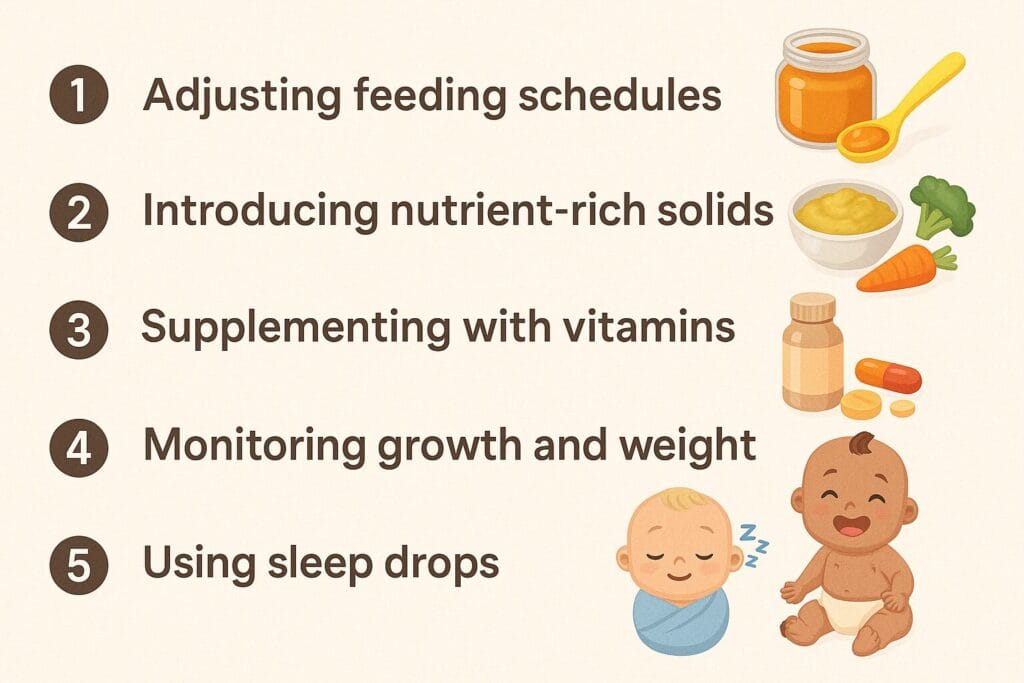
If you’ve found yourself struggling with a baby who wakes up every hour at night, it’s natural to feel exhausted and frustrated. While frequent night wakings are typical for newborns, it may indicate that something deeper is at play when they persist beyond the usual developmental stages. One significant factor is a nutritional deficiency if the baby wakes up every hour. Proper nutrition is essential for your baby’s overall health and is crucial in their ability to sleep soundly through the night.
When we talk about nutrition deficiency, if a baby wakes up every hour, we’re referring to the imbalances in key nutrients such as iron, vitamin D, calcium, and magnesium, which are vital for both growth and sleep regulation. A deficiency in any of these nutrients can result in sleep disturbances, making it difficult for your baby to settle down and stay asleep. This can lead to frequent wake-ups, often in the middle of the night, which leaves you and your baby exhausted.
Addressing nutrition deficiency, especially if the baby wakes up every hour, is essential to improving your baby’s sleep patterns. The first step is identifying the symptoms that might indicate a lack of proper nutrition. These signs can range from irritability, difficulty settling down at bedtime, poor weight gain, dry skin, or even hair loss. If you notice any of these signs and frequent night wakings, it’s worth considering that nutrition could be the root cause.
Iron deficiency is one of the most common deficiencies that contributes to poor sleep. Iron plays a crucial role in oxygen transportation throughout the body, and a lack of it can lead to fatigue and poor sleep quality. If your baby is waking up every hour and showing signs of irritability or fatigue, an iron deficiency could be the cause. Similarly, a nutritional deficiency if the baby wakes up every hour could be related to vitamin D or calcium. Vitamin D helps regulate sleep cycles, while calcium is necessary for muscle relaxation—both are essential for a restful night’s sleep.
Breastfeeding and formula feeding are critical in ensuring your baby receives the appropriate nutrients for healthy growth and sleep. For breastfeeding mothers, ensuring that your milk supply is sufficient and that you are consuming a balanced diet rich in these essential nutrients is key. For formula-fed babies, ensure you choose a high-quality formula that meets all their nutritional needs. However, it’s important to note that some babies may need additional supplementation to correct deficiencies, especially if they show signs of nutritional deficiency, or if the baby wakes up every hour.
Aside from nutritional adjustments, sleep drops for infants can also temporarily soothe your baby and help them fall asleep more easily. Sleep drops containing natural ingredients like chamomile or lavender can help calm your baby’s nervous system, supporting a more peaceful sleep. However, it’s essential to address any potential nutritional deficiencies first, as relying solely on sleep drops will not provide a long-term solution to nutritional deficiency if the baby wakes up every hour.
In conclusion, understanding the connection between nutrition and sleep is vital for improving your baby’s sleep patterns and overall health. Nutrition deficiency, if the baby wakes up every hour, is a serious consideration, and by addressing any nutrient imbalances, you can help your baby sleep better, feel more comfortable, and thrive in their development. Regularly consulting with your paediatrician, monitoring your baby’s feeding schedule, and ensuring they receive proper nutrition can significantly improve your baby’s sleep quality. By taking these steps, you can reduce the frequency of night wakings and enjoy a better night’s sleep, for both you and your baby.



